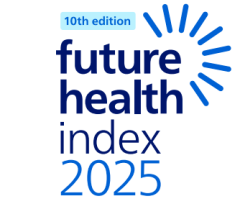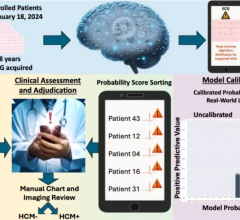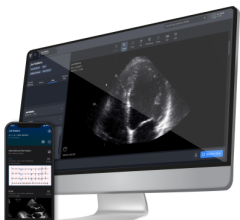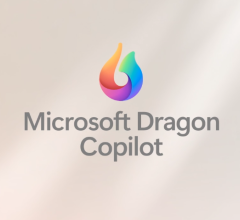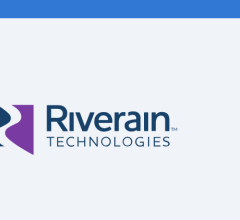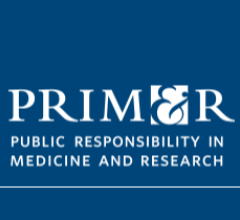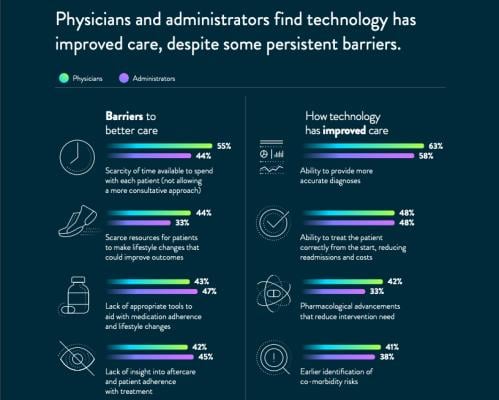
Survey data showing opinions of physicians and hospital administrators on barriers to implementing new technology and how new technologies have improved cardiovascular care.
September 14, 2020 — New global research released by Abbott takes a deep dive into the barriers of cardiovascular patient care and shows that more than 80% of physicians and hospital administrators view technology and data as critical to addressing challenges before, during and after treatment. Abbott surveyed more than 1,400 physicians, hospital administrators and patients to get feedback on gaps in care and how technology may help. The data will be used to help guide Abbott's new technology development efforts.
According to the new data, 79% of patients have confidence in physicians' decision-making, but they feel technology can help deliver more personalized care. More than half of vascular patients globally believe that utilizing the latest diagnostic and treatment technologies can help physicians determine the best treatment plan.
“The ability to meet patients’ emotional needs is directly tied to physicians’ awareness of those patients’ underlying conditions,” explains Dr. Natalia Pinilla-Echeverri, interventional cardiologist at Hamilton Health Sciences/Niagara Health and assistant professor at McMaster University. “There is therefore a real need for physicians to be aware of any baseline conditions that could contribute negatively to therapeutic plans, but unfortunately, most medical records are not unified even at a city level.”
The findings from "Beyond Intervention," a report commissioned by Abbott, show that using advanced technologies can enable more precise diagnoses and better treatment strategies to ensure the best possible results. The survey was designed to examine the current state of vascular care and how health care leaders, physicians and patients view the importance of incorporating data and technology into treatment pathways.
"Technological advances can help providers select and treat the right patients, at the right time, with the right approach, thereby easing the burden on patients, healthcare workers and healthcare systems," said Nick West M.D., chief medical officer and divisional vice president of Medical Affairs at Abbott’s vascular business. "This research identifies how physicians and administrators can improve patient care—and the need for the appropriate use of data and technology to enable more precise diagnoses, to inform shared decision-making, and to determine better treatment strategies to ensure the best possible patient health."
Watch the VIDEO: Survey Shows Large Disconnect in Medical Technology Across Continuum of Care — Interview with Nick West, M.D.
Innovating New Cardiovascular Solutions Based on Clinical Need
Cardiovascular disease (CVD) remains the leading cause of death worldwide,[1] but with proper interventions and post-procedural care, up to 80% of CVD-related deaths may be preventable.[2] To better understand growing treatment gaps in cardiovascular health care and identify new ways to address existing challenges, Abbott commissioned the Beyond Intervention survey to capture feedback from more than 1,400 physicians, health system administrators and patients. The goal of the survey was to uncover how data and technology could better guide physician decision making and improve patient outcomes.
Abbott has targeted gaps in vascular healthcare through technology development and deployment. By focusing on innovative approaches to patient management, including the deployment of new smart applications, remote monitoring and minimally invasive approaches, the company is improving patient care and working to address many of the issues identified by respondents to the Beyond Intervention survey.
In addition, the implementation of new visualization tools like optical coherence tomography (OCT) imaging into percutaneous coronary intervention (PCI) workflows has driven better treatment decisions and ultimately led to improved patient outcomes. As a result, the company has helped enhance cardiovascular care and deliver maximum value to physicians, hospitals and patients alike by utilizing technology to improve patient care before initial treatment, during the procedure and during the post-treatment follow up.
West said Abbott is developing artificial intelligence (AI) to further enhance its OCT capabilities to guide physicians and offer clinical decision support. He said today’s healthcare systems have never been more challenged: the fragmentation of teams and communications, economic challenges and disjointed data streams across the care continuum have resulted in care providers who feel overwhelmed and patients who don’t believe their unique conditions are fully understood. Further, healthcare systems tend to overemphasize “intervention” and “fixing things,” rather than harnessing the power of data to optimize care
across the entire patient journey – before, during and after intervention. These factors lead to diminished patient experiences and potentially poorer outcomes – driving even greater costs for health systems and society.
Watch an interview where West describes the how AI might be used in interventional cardiology in the VIDEO: Artificial Intelligence May Improve Cath Lab Interventions.
Key Research Findings From the Cardiology Technology Survey
The Beyond Intervention research uncovered key views from physicians, hospital administrators and patients that showcase the demand for improved communication between physicians, hospital administrators and patients.
Key findings from the research include:
• Technology and the advancement in cardiovascular tools and practices continue to improve patient outcomes. Imaging tools topped the list of technologies enabling improved vascular care. Overall, tools like wearables, imaging, monitoring and AI-fueled technologies provide valuable information that physicians and administrators across regions deem necessary to provide a more precise intervention. In fact, 33% of U.S. physicians want patients to be more involved in their health through consumer digital health devices/wearables.
• There are growing treatment gaps in cardiovascular health care before, during and after a cardiac procedure or intervention. Fifty-five percent of physicians stated they have little time to spend with patients and 42% have little insight into aftercare and patient adherence, contributing to the growing gaps in patient care. Approximately 63% of U.S. physicians believe at-risk patients can be better identified through greater connectivity between primary care providers and patients.
• Patients increasingly want a personalized health care experience based on data. Patients want more individualized and personalized care, which include more face time with doctors to address questions, a two-way consultative relationship, and an individualized treatment plan based on both personal data and best practices from others with similar cardiovascular issues.
• Diagnostic and data-driven technology will enable a holistic patient view. Seventy-two percent of patients viewed data that "lets my doctor see my problem and act on it in a tailored-for-me manner" as the number one priority. Also ranking near the top was, "patients want physicians to use data results collected from specific procedures or treatments to make personalized recommendations."
"Too often the focus is on refining the procedure, but less on the whole patient experience," said Timothy D. Henry, M.D., medical director, The Carl and Edyth Lindner Center for Research and Education at The Christ Hospital, Cincinnati, Ohio. "Data and technology are crucial components to the patient journey and enabling physicians to provide the highest quality of care. This Beyond Intervention research looks at the entire continuum of patient care and identifies how physicians can deliver and achieve the best outcomes for patients."
Patients Want Personalize Healthcare
Patients’ desire for personalized, highly tailored care could challenge healthcare administrators to rethink the one-size-fits-all programs they have designed to help control costs. The ultimate goal for all stakeholders should be improving patient experiences, outcomes and value throughout the care continuum. For their part, 88% of administrators in our survey named “patient satisfaction” as highly important to the
overall procedure experience in the hospital. The importance of maximizing patient satisfaction extends beyond hospitals – according to US healthcare industry estimates, the departure of a dissatisfied patient can result in a loss of more than $200,000 over a practice’s lifetime.
Another emotional and functional driver of patients’ satisfaction is having confidence in their care provider’s ability to address their individual/personal situation. In Abbott’s survey, 79% of global
patient respondents indicated that they either “strongly” or “somewhat” agree that their “doctor usually knows the treatment plan for me is absolutely correct.”
“The ability to meet patients’ emotional needs is directly tied to physicians’ awareness of those patients’ underlying conditions,” explains Dr. Natalia Pinilla-Echeverri, interventional cardiologist at Hamilton Health Sciences/Niagara Health and assistant professor at McMaster University. “There is therefore a real need for physicians to be aware of any baseline conditions that could contribute negatively to therapeutic plans, but unfortunately, most medical records are not unified even at a city level.”
About the Beyond Intervention Research Cardiology Technology Gap Survey
Abbott surveyed 1,432 physicians, health system administrators and patients from December 2019 through January 2020 to understand the effect of advancements in cardiovascular technology on patient care. Respondents to the online survey represent nine countries: The United States, United Kingdom, China, Japan, France, Germany, India, Italy and Brazil.
The Beyond Intervention market research uncovers the improved patient outcomes that can be achieved through technological innovation and improved data insights across a patient’s care journey. Data-driven decision making and collaboration between physicians, administrators and patients will improve overall patient treatment plans – from understanding risk factors and comorbidities to providing precise diagnoses to making the right treatment decisions that greatly improve wellness and quality of life.
Read the full report and graphs
VIDEO: Survey Shows Large Disconnect in Medical Technology Across Continuum of Care — Interview with Nick West, M.D.
VIDEO: Artificial Intelligence May Improve Cath Lab Interventions — Interview with Nick West, M.D.
References:
1. https://www.who.int/cardiovascular_diseases/about_cvd/en/


 September 24, 2025
September 24, 2025 
